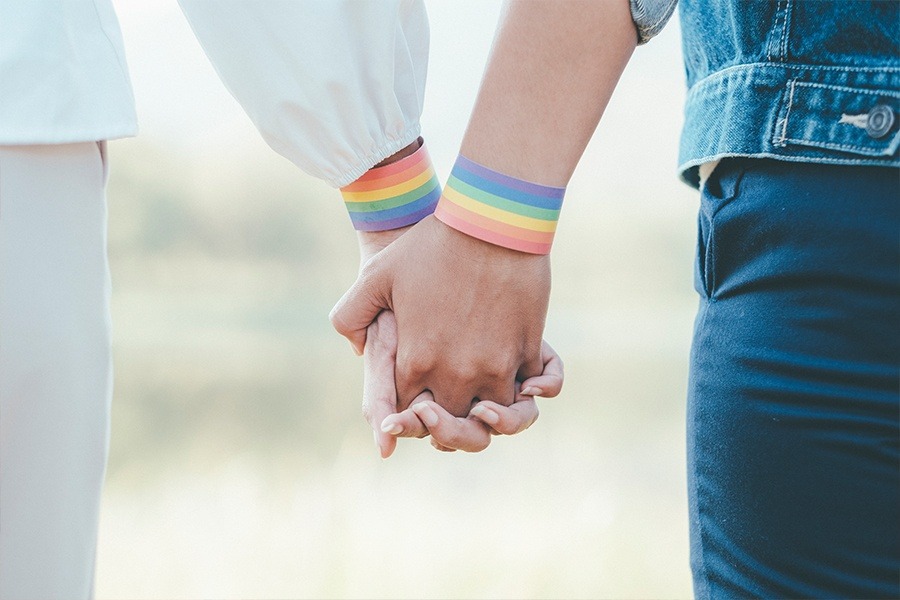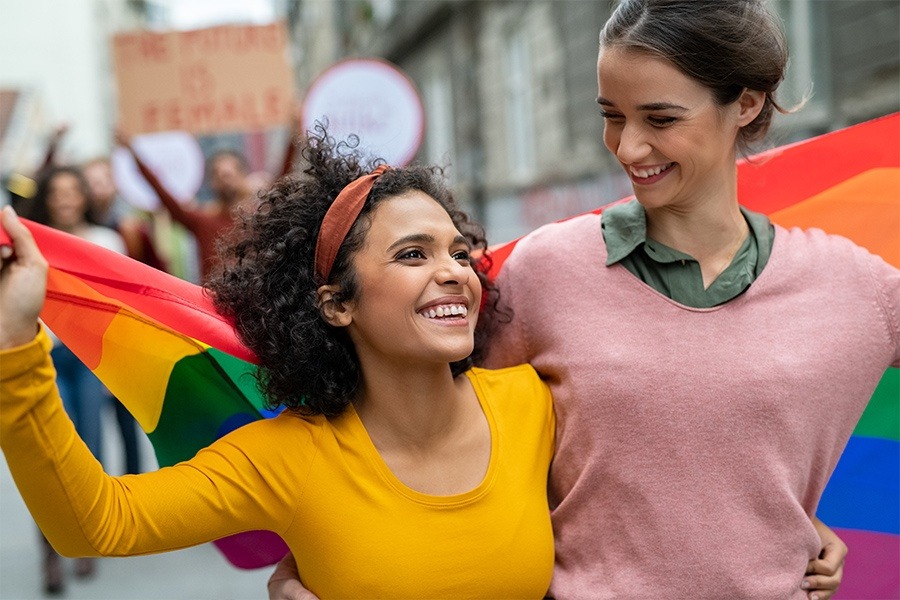There are many different kinds of communities throughout the United States and the world that struggle with being mistreated. One such community is LGBTQ+ individuals. For years, these people have been isolated, shamed, and abused by those who refuse to understand them.
In turn, this has led to a plethora of mental health issues within the LGBTQ+ space. Mistreatment of the LGBTQ+ community and its impact on their mental health is a prevalent issue facing us today. Though this is a grim reality to face, it doesn’t mean all hope is lost. There are many treatment options to help those within the LGBTQ+ community with their mental health.
What is the LGBTQ+ Community?

The LGBTQ+ community is a diverse group encompassing individuals who identify as lesbian, gay, bisexual, transgender, and queer. It also pertains to those who fall under other sexual orientations and gender identities that are non-heteronormative. The “+” symbolizes the inclusion of other groups that are a part of this community but aren’t explicitly stated in the acronym. This community is united by shared experiences, struggles for equality, and a common commitment to acceptance and affirmation.
What is Mental Health?
Mental health refers to our cognitive, emotional, and social well-being. It impacts how we think, feel, act, handle stress, relate to others, and make choices during an ordinary day. It’s important at every stage of life, from childhood and adolescence through adulthood.
Having good mental health doesn’t mean going through bad times or experiencing emotional problems. However, just as physical health is more than not being ill, mental health is more than being free of mental illness. It also involves a sense of well-being, resilience, and recovery from difficulties.
What Mental Health Struggles Does the LGBTQ+ Community Face?
The LGBTQ+ community faces unique mental health struggles, largely stemming from prejudice, discrimination, and societal pressures. These include higher rates of depression, anxiety, and suicidal ideation, often exacerbated by the fear of coming out or experiencing rejection. Additionally, many LGBTQ+ individuals grapple with internalized homophobia or transphobia; this can significantly impact their self-esteem and overall mental well-being. The fight for acceptance and equality introduces an additional layer of stress, further compounding these mental health issues.
Why Does the LGBTQ+ Community Struggle with Mental Health Issues?
The LGBTQ+ community often faces unique struggles with their mental health. Discrimination, prejudice, and the social stigma associated with their identity are common experiences, that lead to increased stress levels. This is further complicated by the lack of societal understanding and acceptance, which can result in feelings of isolation and rejection.
Many individuals within the LGBTQ+ community may internalize negative societal attitudes, leading to internalized homophobia or transphobia; this has the potential to exacerbate mental health issues. Additionally, access to appropriate and empathetic healthcare services can often be a challenge. These cumulative factors lead to the LGBTQ+ community being at a higher risk for mental health issues than heterosexual and cisgender people.
What are Some of the Negative Stereotypes Associated with the LGBTQ+ Community?
The LGBTQ+ community, despite making substantial strides toward acceptance and equality, still grapples with a range of harmful stereotypes. Some people wrongly associate being LGBTQ+ with mental illness or instability, a stereotype rooted in ignorance and fear. Others hold onto the outdated belief that LGBTQ+ individuals are dangerous to children; this has been unequivocally debunked by extensive research. There’s also the stereotype that all people within the community share the same experiences and perspectives. This stereotype is a generalization that fails to acknowledge the vast diversity within the LGBTQ+ community.
Why Negative Stereotypes are Harmful to Mental Health
Negative stereotypes can have a detrimental impact on an individual’s mental health. They foster stigma and discrimination, isolating individuals and pushing them into a corner of self-doubt and fear. The internalization of these stereotypes can lead to increased levels of stress, anxiety, and depression. In addition, they undermine self-esteem and can lead to a negative self-image, further exacerbating mental health issues.
Negative stereotypes are often perpetuated by societal norms and media representations. They can be harmful not only to individuals but also to entire communities and marginalized groups (like the LGBTQ+ community). These stereotypes create unrealistic standards, making it difficult for people to feel accepted and valued for who they truly are.
What are Some Risk Factors in the LGBTQ+ Community for Mental Health?
The LGBTQ+ community faces several unique risk factors contributing to mental health challenges. Among these are discrimination and stigma, which can lead to higher anxiety levels and feelings of isolation. The fear of rejection or mistreatment can also cause anxiety and depression. The process of coming out to friends, family, and coworkers can be a significant cause of stress and anxiety. Minority stress is another factor that can negatively impact the mental health of LGBTQ+ individuals.
LGBTQ+: by the Numbers
According to recent studies, it’s estimated that approximately 4.5% of the adult population in the United States identifies as part of the LGBTQ+ community. However, these figures might not fully capture the diversity of sexual orientations and gender identities; many individuals may choose not to disclose this information.
Exact numbers are challenging to determine due to underreporting and varying definitions of mental health disorders. However, it’s clear that members of the LGBTQ+ community experience mental health issues at a disproportionate rate compared to straight people. LGBTQ+ individuals are over two times more likely than straight/cis individuals to experience a mental health disorder in their lifetime. Factors such as discrimination, stigma, and social exclusion contribute significantly to this higher prevalence.
Why Do People Act Hateful Towards the LGBTQ+ Community?
Some individuals harbor prejudices and act hateful toward the LGBTQ+ community. This behavior often stems from ignorance, fear, or misunderstanding about who LGBTQ+ people are and their experiences. It’s imperative to note that such attitudes are not a reflection of the LGBTQ+ community but rather, a failure to embrace diversity and individuality. Education, open-mindedness, and empathy are crucial in fostering acceptance. There is hope that one day, we will live in a society where all feel accepted regardless of their sexual orientation or gender identity.
Mental Health Treatment for Members of the LGBTQ+ Community
Treatment for mental health concerns in the LGBTQ+ community requires a specialized, empathetic, and inclusive approach. Therapists and mental health professionals should be educated about the unique stressors that individuals in this community may face. These may include discrimination, marginalization, and the process of coming out.
Mental health services should be tailored to consider these unique experiences and challenges. Fostering a supportive environment where individuals can explore their identities and experiences openly and without fear of judgment is imperative. It’s paramount that such treatment not only addresses the individual’s mental health needs but also offers support and understanding.
Some different methods of counseling are often employed, and include the following:
- Cognitive Behavioral Therapy (CBT)
- Individual Therapy
- Group Therapy
- Family Therapy
Cognitive behavioral therapy (CBT) has proven to be particularly beneficial for LGBTQ+ individuals who may be dealing with a variety of mental health challenges. These may include anxiety, depression, or identity-related stress. CBT focuses on helping individuals manage their problems by changing the way they think and behave. Within the context of LGBTQ+ mental health, CBT can provide tools for coping with prejudice, stigma, and other societal pressures. This approach recognizes and validates the unique experiences of LGBTQ+ individuals, fostering an environment of acceptance and understanding.
Individual therapy can be a vital resource for LGBTQ+ individuals, It provides a supportive and affirming environment to discuss personal issues, explore identity, and address any mental health concerns. This therapeutic setting fosters self-understanding, acceptance, and growth.
Individual therapy for LGBTQ+ individuals focuses on topics such as coming out, self-esteem, relationships, or navigating societal prejudices. It’s important to ensure therapy is led by professionals who are knowledgeable and respectful of diverse sexual orientations and gender identities. By doing this, they create a safe space for open dialogue and personal development.
Group therapy can offer significant benefits for LGBTQ+ individuals, serving as a safe, non-judgmental space to explore and articulate their experiences. This therapeutic approach fosters shared understanding and mutual support among group members, facilitating emotional resilience and self-acceptance. It empowers individuals through the realization that they are not alone, fostering a sense of community and shared identity.
Family therapy plays a crucial role in validating the experiences of LGBTQ+ individuals and their families. Therapists can provide a safe space for open discussions on sexuality and identity, facilitating understanding, acceptance, and mutual respect within the family unit. Family therapy addresses potential conflicts, helps families navigate societal prejudices, and strengthens familial bonds.
Is There Insurance Available for Members of the LGBTQ+ Community?
Several insurance companies cater to the needs of the LGBTQ+ community, including coverage for mental health treatment. These companies recognize the unique challenges faced by this community and strive to provide comprehensive coverage. This coverage may include therapy, counseling, and psychiatric services.
Some insurance providers offer specialized plans designed specifically for LGBTQ+ individuals, highlighting their commitment to inclusivity and equal treatment. However, policy details, including mental health coverage, may vary from company to company. It’s crucial to thoroughly review any insurance plan before choosing the one that best fits your needs.
How to Find the Right Mental Health Professional to Assist Your LGBTQ+ Needs
Finding the right mental health professional for your LGBTQ+ needs requires a thoughtful and intentional approach. It’s crucial to seek a therapist who not only possesses the necessary expertise and credentials but also displays empathy, understanding, and respect. The therapist should be committed to ongoing education about LGBTQ+ issues, and up-to-date with the evolving social, political, and cultural landscape. Remember, getting the right help is not a luxury, but a fundamental right.
Westwind Recovery® Cares About the Mental Health of the LGBTQ+ Community
At Westwind Recovery®, we understand that living as an LGBTQ+ individual is not easy. Many people discriminate and are hurtful towards the LGBTQ+ community. This can cause a person’s mental health to suffer. If you would like to find out more about what we offer for LGBTQ+ individuals, you can contact us here.

Dr. Deena is the Chief Clinical Officer of Westwind Recovery®, an award-winning outpatient treatment center in Los Angeles where she oversees the clinical and administrative program and treatment methods. Dr. Deena is a doctor of psychology and licensed clinical social worker since 1993. LCSW #20628. Originally from the East Coast, Dr. Deena has worked running treatment centers, worked as a therapist in psychiatric hospitals as well as school settings and currently has a thriving private practice in the LA area. Dr. Deena has appeared regularly on the Dr. Phil Show as an expert since 2003. She has also been featured on many other TV shows, podcasts and has contributed to written publications as well as podcasts.




